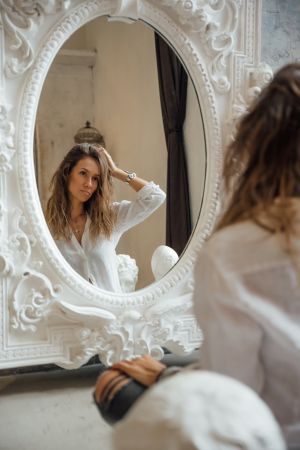When You Look in the Mirror?
One of the most profound questions I ask my clients is…
What do you see when you look in the mirror?
Perhaps you’ve encountered this question before, or even tried to answer it. It’s a classic reflection exercise, and the responses I receive vary greatly—some people even laugh when they hear it. But even that first reaction is telling. It reveals something about what they truly see in the mirror.

Some individuals are simply not ready to answer, while others fear the response they might uncover. In my experience, particularly with clients facing difficulties in life, I have yet to meet someone who immediately gives a positive answer or genuinely sees themselves in a good light. In fact, one of the most disheartening responses I have ever received was: failure.
Looking Beyond the Surface
So, what do you see when you look in the mirror?
Who is the person staring back at you?
I’m not referring to physical features such as hair colour or eye colour. I’m talking about looking into your own eyes—into your soul. Seeing your life, your place in it, your values, your worth, and your talents. Recognising what you are truly capable of.
But getting to that place requires breaking down a wall—one that many people have built to protect themselves. Most individuals put up barriers because they are afraid of what lies behind them, not wanting anyone else to see their vulnerabilities. Often, they don’t even want to see themselves.
It’s important to understand that whatever fears or negativity you uncover initially, that’s not the real you.
Those are beliefs and messages absorbed over time, things that others have instilled in you. For example, if someone thinks, I’m not worthy or I am useless, where did those thoughts come from? Because the truth is—you are worthy. You do have great value. If you ever doubt that, take a moment to reflect: Who told me this? That opinion did not originate from you; it came from someone else.
The Power of Words & Beliefs
Hearing something repeatedly—especially negative things—can lead us to believe it as truth. Our minds are incredibly powerful, just like the words we hear and speak.
To truly understand who we are, we must look back. Were we born believing we were not worthy? Did we enter the world thinking we were failures? Did we experience anxiety or depression as newborns? Of course not.

Babies are born with only a few fundamental emotions: interest, distress, disgust, and happiness. Between the ages of two and six months, they begin to experience hunger, sadness, surprise, and fear—yet fear in a baby does not equate to anxiety. So where do these deeper emotional struggles come from?
The Role of Childhood Experiences
Our first interactions are with our parents. They teach us about responsibility, self-control, guilt, and other emotions. Siblings may introduce us to jealousy, empathy, and patience. As we grow, we learn about boredom, calmness, craving, excitement, relief, and satisfaction. Starting school introduces new experiences—frustration, shame, and, inevitably, unkindness from others.
During our early years, particularly as teenagers, we gradually learn how to manage these emotions. In a healthy family environment, parents recognise a child’s value, praise their strengths, comfort them when needed, listen to their thoughts, and try to understand their struggles.
For a child, even small moments—like a broken toy or a torn doll’s dress—can feel like the end of the world. While trivial to an adult, these situations are significant for a child in that moment. If adults fail to acknowledge these feelings, it can leave a lasting impact. If a child frequently feels unheard or unimportant, it plants the first seeds of self-doubt.
How Childhood Influences Adulthood
Not every difficulty stems from childhood, but early experiences shape how we navigate life. A child who repeatedly asks for help but is met with disinterest will eventually stop seeking support. As an adult, they may struggle to ask for help, believing they must handle everything alone. No matter how sad or overwhelmed they feel, they will keep it to themselves, convinced that no one will truly be there for them. They may even begin to believe they are failures, especially if someone reinforces this belief through mistreatment or abuse.
Breaking Down the Wall
Now, back to that mirror. Making mistakes does not make us failures. We don’t need to prove our worth to anyone. Just because we’ve had to do things alone doesn’t mean we are alone or that we can’t seek help.
Breaking down the emotional barriers we’ve built—brick by brick—allows us to see ourselves clearly.

We can acknowledge our struggles, our resilience, and the strength it took to get to where we are today. Often, these barriers were formed by the words of others, sometimes even by those closest to us—family, partners, or children. Because we love and trust them, we believe them. But dismantling these walls is a necessary and transformative process.
It takes time, and it can be an emotional journey.
But it’s always worth it.
If you look in the mirror and can’t see your true value, remember: there is a wall in front of you, not a reflection of who you are. And once you begin to break it down, you must commit to going all the way. Be honest with yourself. Welcome every emotion that arises—whether sadness, anger, or frustration. It’s okay not to be okay sometimes.
But don’t linger in those feelings. Understand where they come from, who placed them there, and why they are no longer relevant to your present or future. Those beliefs belong to your past. And you do not live in the past—you live in the now.

So, as you look in the mirror today, ask yourself again…
Who do you see?
Main – Photo by Suhyeon Choi on Unsplash



